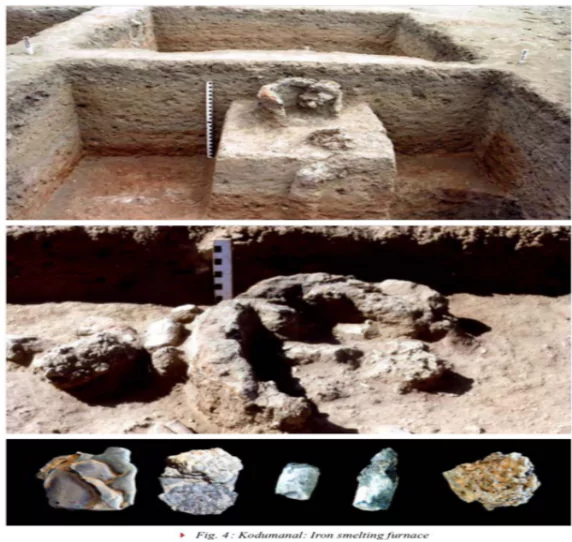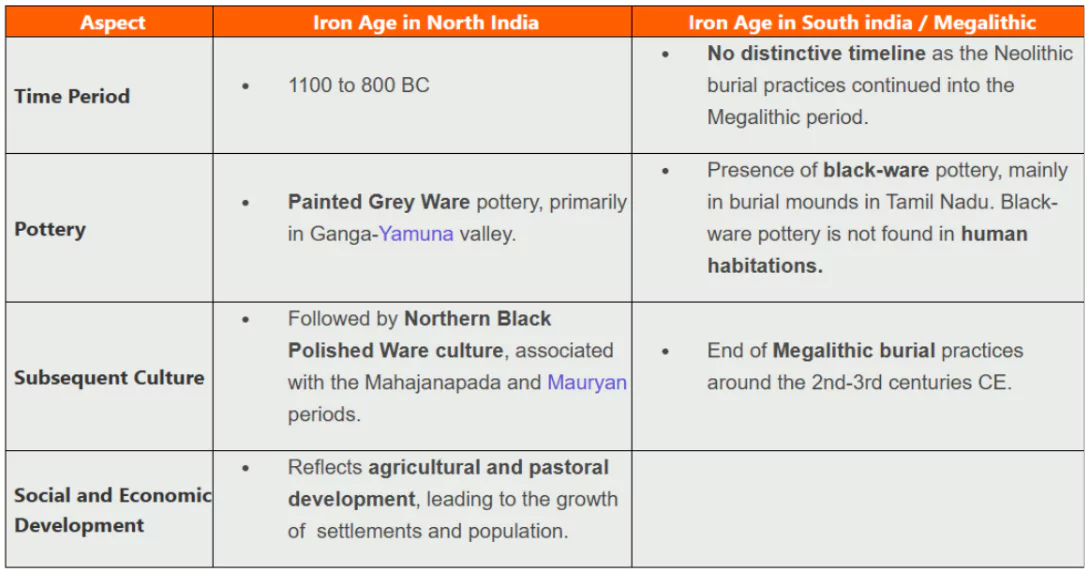Recent studies have pushed back the timeline of the Iron Age in India, revealing that iron use in Tamil Nadu dates as early as 3345 BCE, making it the earliest known use of iron globally.
- For decades, the origins of the Iron Agewere largely centered around regions such as Mesopotamia, Anatolia, and the Indus Valley, with timelines often placed between the 2nd and 1st millennia BCE.
Key Findings
- Study Report: ‘Antiquity of Iron: Recent Radiometric Dates from Tamil Nadu’
- Scientific methods: The findings are supported by Accelerator Mass Spectrometry (AMS) and Optically Stimulated Luminescence (OSL) analyses conducted on samples from archaeological sites.4
 Dating and Sites:
Dating and Sites:
- Sivagalai: Evidence of iron dating from 2953–3345 BCE, with a paddy sample dated to 1155 BCE.
- Mayiladumparai: Iron artifacts dated to 2172 BCE, surpassing previous benchmarks for the region.
- Kilnamandi: A sarcophagus burial dated to 1692 BCE, marking the earliest of its kind in Tamil Nadu.
- Technological Advances:
- Iron Smelting: Advanced furnaces were found at Kodumanal, Chettipalayam, and Perungalur, with Kodumanal’s furnaces reaching 1,300°C, enough for sponge iron production.
- Hypothesis: Northern India’s Copper Age and southern India’s Iron Age may have been contemporaneous due to the scarcity of copper in the south.
- Rewriting History: The Tamil Nadu findings challenge the traditionally accepted Iron Age timeline, previously attributed to the Hittite Empire (1300 BCE).
- Ironwork first began in Turkey before spreading to other European countries
Enroll now for UPSC Online Course
Accelerator Mass Spectrometry (AMS) and Optically Stimulated Luminescence (OSL)
- Both are dating techniques used in archaeology and geology to determine the age of materials.
- Working principles:
- AMS primarily analyzes the radioactive carbon-14 content of organic materials to date relatively recent events,
- OSL measures trapped electrons in mineral grains to date sedimentary deposits that have been exposed to sunlight, allowing for dating of much older materials like sand and soil.
|
Phases of the Iron Age in India
- Early Iron Age (1500 BCE – 1000 BCE):
- Introduction of iron tools for agriculture and hunting (e.g., Hallur, Karnataka).
- Overlaps with the late Vedic period (texts like the Atharvaveda).
- Key Sites: Atranjikhera (Uttar Pradesh), Malhar (Chhattisgarh), etc.
- Middle Iron Age (1000 BCE – 600 BCE):
- Expansion of iron technology and urbanization.
- Emergence of Painted Grey Ware (PGW) culture in the Ganga-Yamuna plains.
- Fortified settlements like Kausambi and the rise of Janapadas.
- Key Sites: Kausambi (Uttar Pradesh), Atranjikhera (Uttar Pradesh)
- Late Iron Age (600 BCE – 200 BCE):
- Formation of Mahajanapadas and the Mauryan Empire.
- Spread of Buddhism and Jainism; Ashoka’s ethical edicts.
- Key Urban Centres: Pataliputra (Patna), Ujjain.
Key Features of the Iron Age
- Iron Technology: Advanced smelting techniques for durable tools and weapons.
- Agricultural Revolution: Use of iron ploughs and sickles led to surplus food production.
- Urbanization: Development of fortified cities with drainage systems and public buildings.
- Political Structures: Emergence of Janapadas, Mahajanapadas, and the dominance of the Mauryan Empire.
- Cultural Growth: Composition of texts like the Upanishads and the rise of Buddhist and Jain philosophies and art.
Check Out UPSC CSE Books From PW Store

Ready to boost your UPSC 2025 preparation? Join PW’s UPSC online courses today!
![]() 25 Jan 2025
25 Jan 2025

 Dating and Sites:
Dating and Sites:
